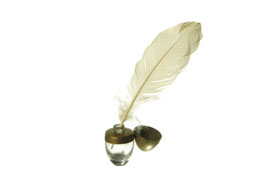
March 27, 2014

Source: Shutterstock
So for someone of my generation, there’s a lot of familiar or half-familiar verse here.
Much of the charm of Turner’s book is in the forgotten pieces he resurrects to create the Victorian atmosphere”an atmosphere of sentimentality, patriotism, exhortations to courage and endurance, and heavy moralizing.
There was much to moralize about:
But say, when you are wooed,
“I”m a foe to the wine,
And the lips that touch liquor shall never touch mine.”
Death was an obsession. Turner tells us in his preface that: “The death-toll of Parlour Poetry, excluding the preface and notes, is thirty-eight men, women, and children, in addition to an unspecified number of soldiers, sailors, and German peasants, and two horses.”
The death of a child, all too common an occurrence before modern medicine, was an especially popular subject for verse:
“Tell father when he comes from work
I said “goodnight” to him;
And, mother, now I”ll go to sleep,””
Alas, poor little Jim.
Little Jim is followed into the hereafter by Little Willie, Little Boy Blue, Anon., Little Billy and his sister Nell, the daughter of the Hesperus skipper, and Casabianca, Jr. (on the burning deck).
It was a grim world back then, all right, but at least they had poetry to console them: popular poetry that ordinary people could read and recite with pleasure. My mother, a coal-miner’s daughter who left school at fourteen to go into domestic service, could recite all of “Excelsior.” My Dad could sing Kipling.
It’s all gone now. Poets still toil away, but nobody reads them. It’s the same everywhere. Thirty-odd years ago I got interested in Chinese poetry. Teaching college in China, I had a student who knew the subject and even wrote poetry himself. He explained a lot of things I didn”t understand about the traditional styles and structures.
Twenty years after that I encountered him in the USA, where he works as a software developer. Did he remember our talk about poetry? Did he still write verse himself?
He looked a bit embarrassed. Yes, he remembered our talk; but no, he no longer read or wrote poetry. “In this busy modern life, no time!”
Too true, but sad all the same. We live in an age of no poetry”the first such age in all of human history.